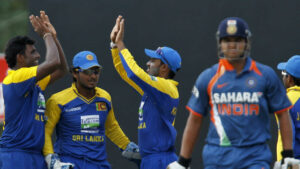India, a cricket powerhouse with a rich history of producing world-class players, has had its share of lows in the One Day International (ODI) format. Despite their dominance on the global stage, there have been several occasions where India’s batting lineup faltered miserably, resulting in some of their lowest total scores. Let’s take a look at the five lowest totals posted by India in ODI history.
1. 54 all-out
Opponent – Sri Lanka
Date – 29 October 2000
Venue – Sharjah Cricket Stadium, Sharjah
India established the record for the lowest ODI score on October 29, 2000, at the Coca-Cola Champions Trophy final in Sharjah. Chasing a 300-run total set by Sri Lanka, India’s batting collapsed against a disciplined Sri Lankan bowling attack headed by Chaminda Vaas.
The Indian team was bowled out for a mere 54 runs in just 26.3 overs. Vaas took 5 wickets for 14 runs, highlighting one of India’s worst days in ODI cricket. In a lineup that included Sourav Ganguly, Sachin Tendulkar, and Yuvraj Singh, only Robin Singh scored more than a double-digit total.
2. 63 all-out
Opponent – Australia
Date – 8 January 1981
Venue – Sydney Cricket Ground, Sydney
In earlier times, when the One Day International format wasn’t highly regarded, the Indian team captained by Sunil Gavaskar fell to a total of just 63 runs in their first innings against the formidable Australia. During the Benson & Hedges World Series Cup, India was invited to bat first, but Greg Chappell caused chaos by taking five wickets while conceding only 15 runs in a spell lasting 9.5 overs.
The Indian side was bowled out for a mere 63 runs in 25.5 overs. Gundappa Viswanath was the top scorer with 23 runs, and Roger Binny was the only other player to reach double digits. Australia successfully chased down the target in under 21 overs, losing only one wicket, which was taken by the legendary Kapil Dev.
3. 78 all-out
Opponent – Sri Lanka
Date – 24 December 1986
Venue – Green Park, Kanpur
In a dismal outing, India was dismissed for just 78 runs against Sri Lanka in an ODI match on December 25, 1986. Sri Lanka managed to post a respectable total of 195 runs while batting first. Nonetheless, India was overwhelmed by a fantastic bowling performance from Sri Lankan spinner Arjuna Ranatunga, who claimed 4 wickets for 14 runs in merely 6 overs. The Indian batting lineup crumbled after the early loss of Sunil Gavaskar and Raman Lamba. Following a string of low scores, India was all out for 78 runs in 24.1 overs.
4. 79 all-out
Opponent – Pakistan
Date – 13 October 1978
Venue – Jinnah Stadium, Sialkot
India scored their fourth-lowest ODI total in 1978 at Sialkot, one of the first ODI matches between India and Pakistan. India only scored 79 runs when they batted first, and none of the batsmen contributed much.
The Indian batting lineup was completely destroyed by Pakistan’s bowling assault, which was spearheaded by Hasan Jamil and Sikander Bakht. Bakht and Jamil each took seven wickets. Pakistan achieved a commanding and easy 8-wicket victory after chasing down the mark in only 16.5 overs.
5. 88 all out
Opponent – New Zeland
Date – 10 August 2010
Venue – Rangiri Dambulla International Cricket Stadium, Dambulla
India was bowled out for 88 runs against New Zealand in Dambulla on August 10, 2010, during the tri-series played in Sri Lanka. Following a 190-run partnership between skipper Ross Taylor (95) and Scott Syris (89), New Zealand, batting first, amassed a formidable 288 runs.
Before wickets continued to fall like a deck of cards, Virender Sehwag and Dinesh Karthik enjoyed a respectable opening partnership of 39 runs. The men in blue were bowled out for just 88 runs by Kyle Mills and Jacob Oram, who each took two wickets, while Daryl Tuffey took three. This resulted in a win of 200 runs for the Kiwis.
These five matches remain some of the most humiliating moments in Indian ODI history. Despite being one of the most successful teams in the format, India has experienced its fair share of batting collapses that have led to low scores and heavy defeats. However, such setbacks have also been part of India’s cricketing journey, with the team consistently learning from these experiences and bouncing back stronger. In the unpredictable world of limited-overs cricket, these matches serve as a reminder of how quickly fortunes can change, and how important it is to stay resilient in the face of adversity.




